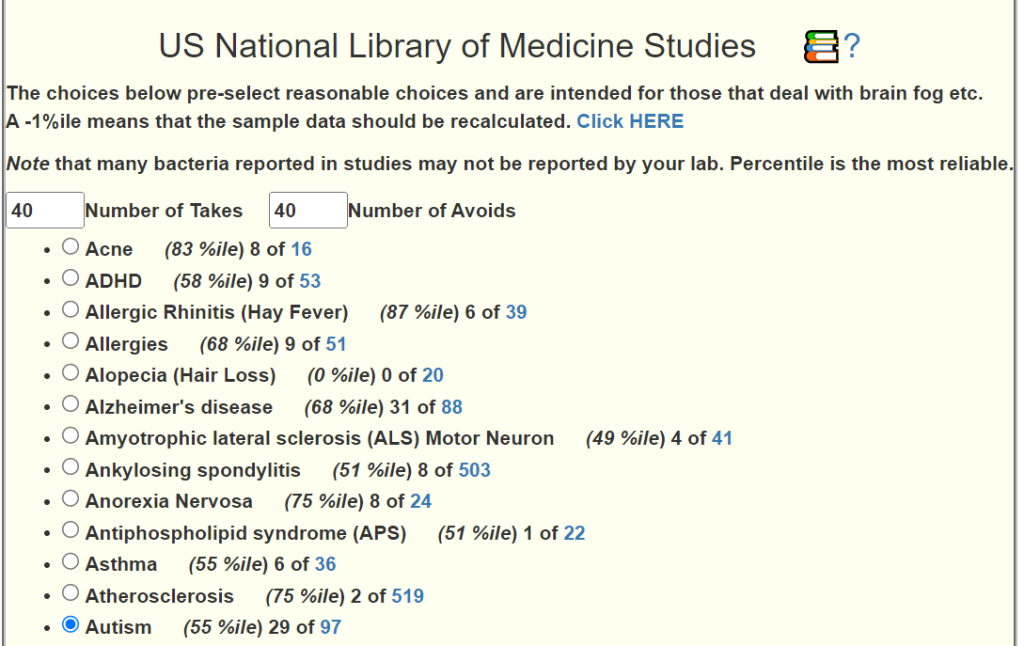A good starting point is: Interconnection between Microbiota-Gut-Brain Axis and Autism Spectrum Disorder Comparing Therapeutic Options: A Scoping Review [2023] a few quotes (worth reading the whole thing!)
Kang and colleagues created a modified FMT procedure called MTT for autistic youngsters [29]. This therapy alleviated ASD behavioral symptoms to some extent, with excellent tolerance indicated and improvements lasting 2 years after treatment ceased….Fascinatingly, microbial metabolic genes for folate biosynthesis, oxidative stress defense, and sulfur metabolism were dissimilar from those found in normally developing (TD) patients at ASD baseline but mirrored those found in TD and/or donors following MTT [56].
Several investigations in recent years have indicated qualitative and quantitative changes in the gut flora in a variety of neuropsychiatric illnesses, supporting the role of Gut Microbiome (GM) in the maintenance of physiological condition in the CNS. Within neurobehavioral disorders, it appears that at least a portion of ASD instances are linked to, and maybe reliant on, the health and wellbeing of the GM.
Related FMT Studies:
- Efficacy of Fecal Microbiota Transplant on Behavioral and Gastrointestinal Symptoms in Pediatric Autism: A Systematic Review. [2023]
- Effect of fecal microbiota transplantation in children with autism spectrum disorder: A systematic review. [2023]
- Fecal Microbiota Transplantation in Autism Spectrum Disorder. [2022]
- Shotgun Metagenomics Study Suggests Alteration in Sulfur Metabolism and Oxidative Stress in Children with Autism and Improvement after Microbiota Transfer Therapy. [2022]
Caution: FMT can be tricky — determine the appropriate FMT sample to use is still being investigated. The donor microbiome should exhibits none of the shifts documented below, ideally the opposite direction.
Other Recent Studies
- Dietary fish oil improves autistic behaviors and gut hoeostasis by altering the gut microbial composition in a mouse model of fragile X syndrome. [2023]
- This is cited as positive on our A Priori suggestions for the bacteria below.
- Lactobacillus reuteri normalizes altered fear memory in male Cntnap4 knockout mice. [2022]
- This is cited as positive on our A Priori suggestions for the bacteria below.
Reported Shifts
Based on the literature cited here. We find the most frequently reported listed below. Note that Lactobacillus is high 8 times and low 5 times. My usual attitude when there are such contrary results is to ignore this species entirely.
This leads to the following probiotic suggestions:
- Do not use Lactobacillus — it is unclear if it will help or hurt
- Supplement with Bifidobacterium probiotics and items that support the growth of this bacteria
- bifidobacterium longum (probiotics) is the species that seems to be best in general
Bifidobacterium longum CCFM1077 Ameliorated Neurotransmitter Disorder and Neuroinflammation Closely Linked to Regulation in the Kynurenine Pathway of Autistic-like Rats. [2022]
Different Alterations in Gut Microbiota between Bifidobacterium longum and Fecal Microbiota Transplantation Treatments in Propionic Acid Rat Model of Autism. [2022]
- bifidobacterium longum (probiotics) is the species that seems to be best in general
- Supplement with Akkermansia muciniphila probiotics
- Supplement with Veillonella probiotics when it becomes available.
| Tax_Name | Direction L – Low H – High | Studies |
| Bifidobacterium | L | 13 |
| Lactobacillus | H | 8 |
| Coprococcus | L | 7 |
| Prevotella | L | 7 |
| Streptococcus | L | 6 |
| Veillonella | L | 6 |
| Dialister | L | 6 |
| Bacteroides | L | 5 |
| Lactobacillus | L | 5 |
| Parabacteroides | L | 5 |
| Sutterella | H | 5 |
| Clostridium | H | 5 |
| Candida | H | 4 |
| Clostridium perfringens | H | 4 |
| Collinsella | H | 4 |
| Desulfovibrio | H | 4 |
| Sarcina | H | 4 |
| Megamonas | H | 4 |
| Fusobacterium | H | 4 |
| Lachnospiraceae | L | 4 |
| Veillonellaceae | L | 4 |
| Bilophila | L | 4 |
| Blautia | L | 4 |
| Akkermansia Muciniphila | L | 3 |
Using Microbiome Prescription
For getting a microbiome sample, it is suggested that Thorne be used because it reports Clostridium perfringens levels in almost every sample. Ombre and Biomesight only report finding it between 11–16% of the time.
Then use this to generate suggestions specific for the autism associated bacteria shifts.

Next Post — Cross Validation
Cross Validation means checking the a priori suggestions (based on above bacteria shifts) against the literature to see if they agree. Three examples are above where studies and suggestions are in agreement.
It seems that individualized donor/recipient matching may also be helpful? This paper seemed to find such a approach useful for ulcerative colitis – https://www.ncbi.nlm.nih.gov/pmc/articles/PMC9927247/